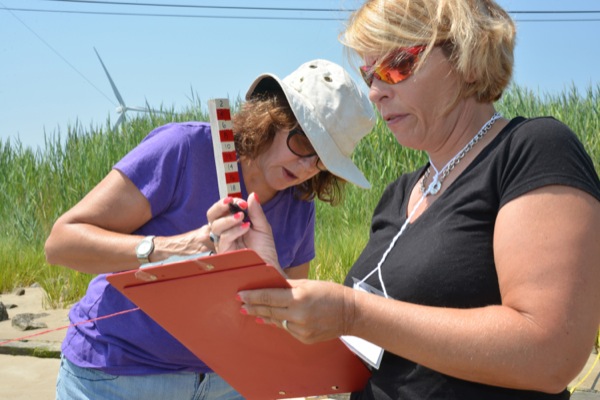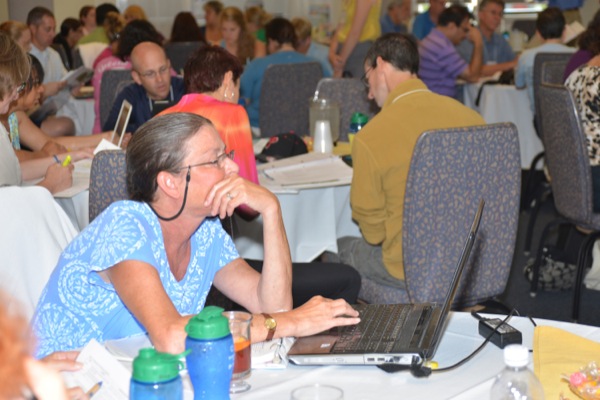Climate science academy
MADE CLEAR training helps teachers with climate curriculum
10:56 a.m., Nov. 22, 2013--Changing science standards — and a changing climate — have science educators in Delaware changing the way they teach in the classroom.
The Maryland-Delaware Climate Change Education, Assessment, and Research (MADE CLEAR) partnership, led by the University of Delaware and the University System of Maryland, is helping with the transition.
Campus Stories
From graduates, faculty
Doctoral hooding
The partnership brought together 25 teachers for a weeklong academy at UD’s Hugh R. Sharp Campus in Lewes, Del., last summer for lectures, hands-on activities and workshops by expert climate scientists and science educators. Follow-up sessions this month and in the spring give teachers the opportunity to report on the effectiveness of their classroom implementation.
“The hope is that this academy is really cutting-edge and informative for teachers,” said Randy McGinnis, professor of science education at the University of Maryland.
Delaware adopted the Next Generation Science Standards in September, which include climate science for middle and high school students. MADE CLEAR’s programs reinforce content in the standards, helping science teachers learn about new climate change science resources to utilize.
Teachers can use the fresh concepts and curriculum learned in classes such as earth science, biology, chemistry, physics and environmental science — supplementing materials already in use.
MADE CLEAR brings together climate scientists, formal and informal educators, and education researchers to develop the best approaches for teaching climate change in and out of the classroom. The partnership serves as a platform for educators to discuss and develop shared messages and recommend resources for incorporating climate science into curricula.
“It’s a community of practice for interaction and support for the participants long after the academy is over,” said Nicole Shea, a research associate at UD and professional development organizer for MADE CLEAR participants.
Jennifer McHenry, an eighth grade science teacher at Fifer Middle School in Camden, Del., said she wanted to participate in MADE CLEAR because she is in her second year as a teacher and the academy seemed like an enticing approach to new information and teaching methods.
“It can be difficult for science teachers to find accurate and up-to-date information since sources on the Internet are not always reliable,” said Chris Petrone, education specialist with Delaware Sea Grant and co-organizer of the program. “But we’ve honed the best resources and are providing those to the teachers of this academy and in turn, their students.”
About MADE CLEAR
MADE CLEAR is led by the University System of Maryland and the University of Delaware and includes participation of faculty members from the University of Delaware, Delaware State University, the University of Maryland, College Park, the University of Maryland Center for Environmental Science and Towson University.
Key to the partnership is the participation of the Maryland State Department of Education, the Delaware Department of Education, Maryland Public Television and state and federal science agencies, including the state departments of environmental and natural resources, the National Aeronautics and Space Administration and National Oceanic and Atmospheric Administration.
This project is one of six Phase II projects being funded by the National Science Foundation (NSF) through the Climate Change Education Partnership (CCEP) program.
The CCEP program is a one-time, dedicated NSF effort to establish a coordinated national network of regionally- or thematically-based partnerships devoted to increasing the adoption of effective, high quality educational programs and resources related to the science of climate change and its impacts.
The vision of this program is a scientifically literate society that can effectively weigh the evidence regarding global climate change as it confronts the challenges ahead, while developing the innovative scientific and technical workforce to advance knowledge of human-climate interactions and develop approaches for a sustainable, prosperous future.
For more information, visit the MADE CLEAR website.
Article by Annie R. Birney
Photos by Lisa Tossey












